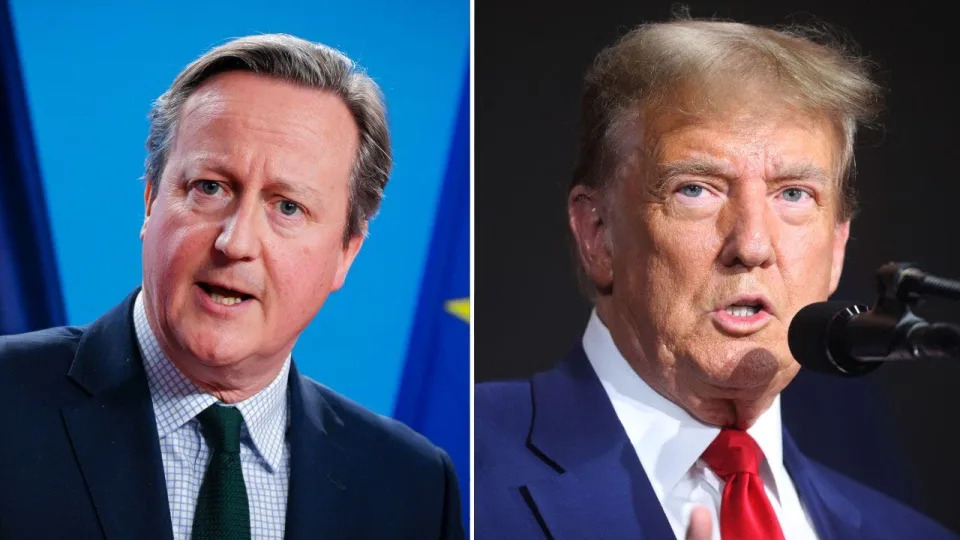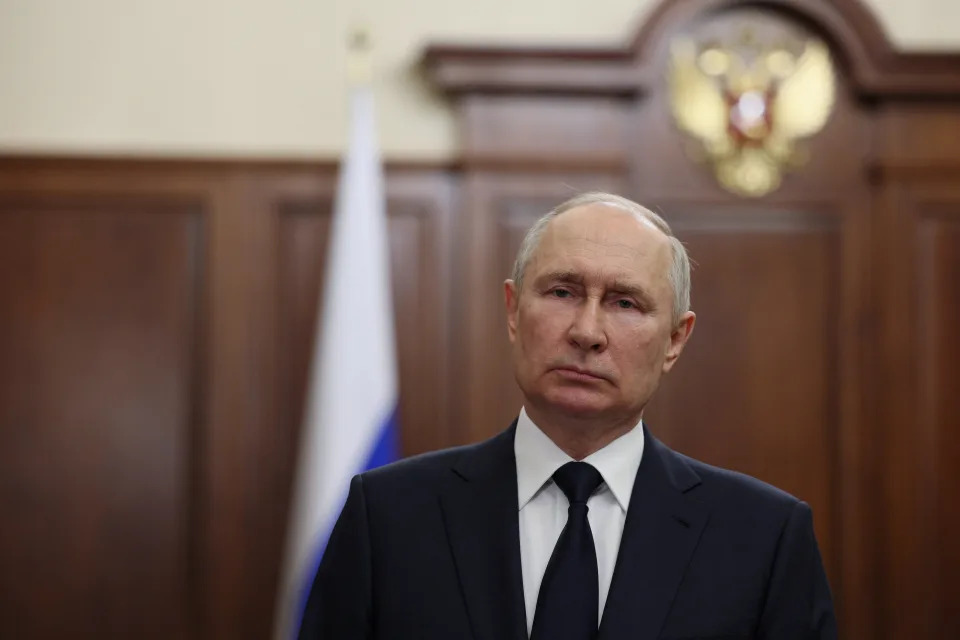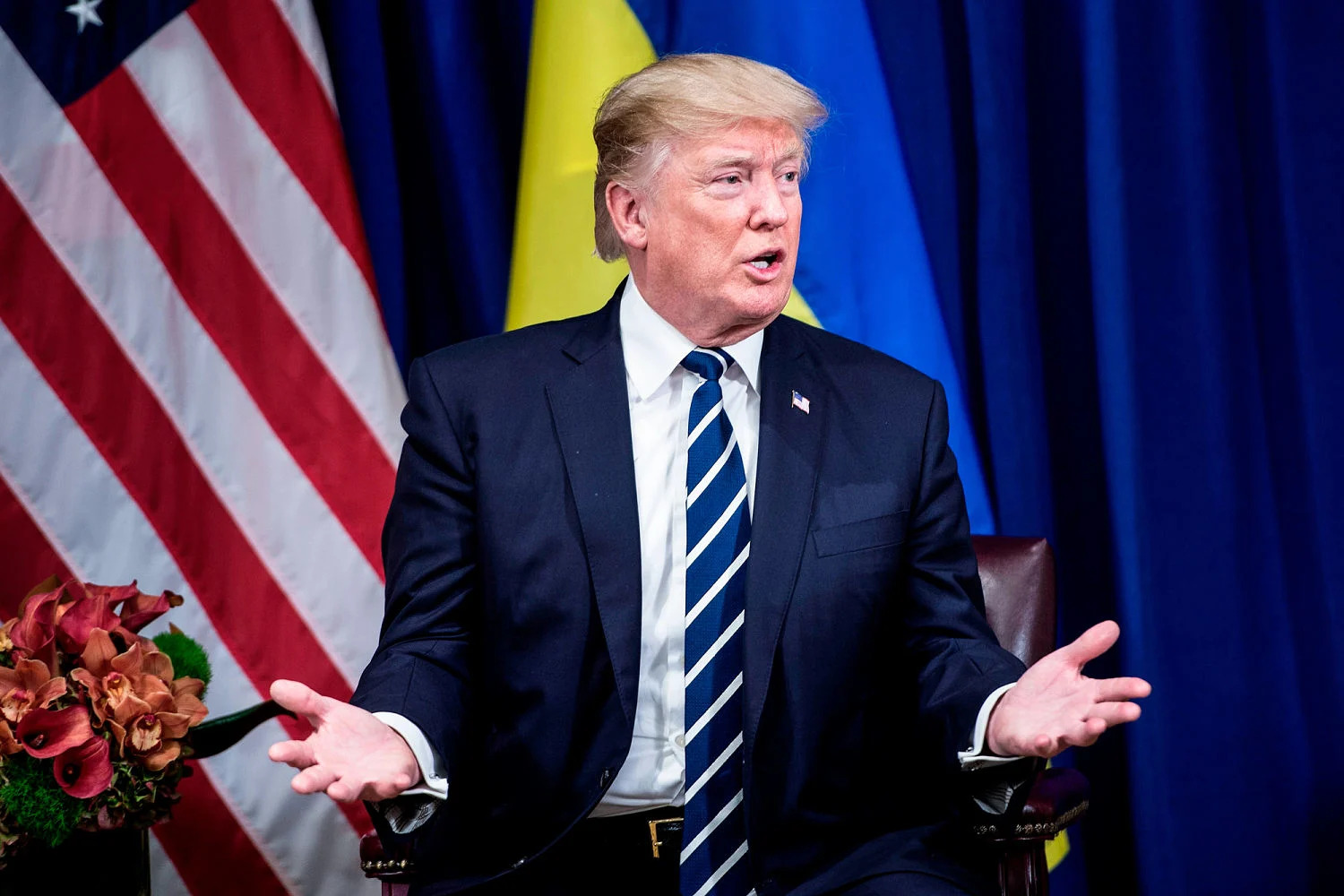Former President Donald Trump, the presumptive GOP presidential nominee, hasn’t said a lot about Russia’s war in Ukraine, the biggest international news story before Israel’s war against Hamas in Gaza shoved it off the front pages. When Trump does mention the conflict, he tends to keep his comments extremely vague. At times, they’re contradictory.
The day before Russia’s full-scale invasion more than two years ago, for instance, Trump called Russian President Vladimir Putin “genius” and “savvy” for declaring Ukraine’s Donbas region independent and using it as a pretext to send Russian forces in. Weeks later, once the invasion was in full swing, the former president was more morose on Putin: “Now, a lot of things are changing. … This doesn’t seem to be the same Putin that I was dealing with.”
But through it all, Trump has been consistent on one thing: The war should end sooner than later, ideally immediately. During a May 2023 CNN town hall, he stated that he wanted Russians and Ukrainians alike “to stop dying” and that striking a deal was the only way to do it. He has bragged repeatedly that he could hammer out a peace deal in 24 hours, even as he refuses to articulate his strategy for pulling off such a feat.
We now possibly know more details of Trump’s proposed Russia-Ukraine strategy, as reported by The Washington Post over the weekend. The Post cites people who discussed the plan with Trump or his advisers, who spoke on the condition of anonymity about confidential conversations and suggest Trump would plan to push Ukraine to hand over control of Crimea and the Donbas region to Russia in any future settlement, in effect codifying the gains Putin has made in his illegal invasion. In return, Putin would have to stop the war for good.
The Washington Post report was met with a flurry of criticism. Sen. Lindsey Graham, R-S.C., a Trump ally, said he was opposed to giving Russia land. The rumored plan raised eyebrows in Kyiv as well, with one former Ukrainian interior ministry official arguing that giving Russia a “face-saving” way out meant destroying the very post-World War II rules-based order the U.S. and its allies claim to defend. Even Robert Reich, President Bill Clinton’s former secretary of labor, piled on: “Did we learn nothing from WWII and the danger of appeasement? Give an inch, he’ll take it all,” he posted on X. Trump campaign adviser Jason Miller blasted the Post report as fake news.
Are there problems with Trump’s reported land-for-peace idea? No question. But as the war goes on, the realistic alternatives are becoming more difficult to spot.
Such measures would certainly not be welcome in Kyiv. Ukraine, for one, scoffs at the notion that formally gifting Putin a chunk of its territory would result in a long-term peace. Ukrainian President Volodymyr Zelenskyy has argued that any cease-fire would only benefit Russia in the end, allowing it to recuperate and rebuild before the inevitable counterattack. Last summer, during the beginning of Ukraine’s counteroffensive in the east, European Commission President Ursula von der Leyen stated that cease-fires with Russia are only short-term aberrations rather than a true peace. Zelenskyy himself has been outright dismissive of Trump’s “I can solve it in 24 hours” boast, all but telling him to visit Kyiv so he can receive an education.
You can’t blame analysts and world leaders — anybody, really — for rolling their eyes at this specific peace formulation, at least in today’s circumstances. The practicalities of negotiating it, yet alone implementing it, are extremely challenging. The Ukrainians are still very much committed to their own 10-point peace plan, first unveiled by Zelenskyy in November 2022, that demands a full Russian troop withdrawal from every inch of Ukrainian territory, a justice mechanism to prosecute Russians for war crimes, security assurances from the West and compensation for damages. Ukraine’s inability to gain any more ground over the last 18 months hasn’t changed this position in any notable way. On the other side, Putin, his power solidified at home after a stage-managed “election” last month, is in no mood to negotiate at a time when the Russian army is engaged in several counteroffensives along the 600-mile-long front line and weeks after Moscow experienced its biggest territorial victory in nearly a year.
Trump’s purported plan leaves even more to be desired. Russia, for example, doesn’t control all of the Donbas, which means that for the scheme to work, Ukraine would have to voluntarily withdraw from the entire region after spending two years trying to liberate that very same stretch of land. To be blunt, this is as likely as Putin waking up one morning and deciding to withdraw Russian forces from Crimea. Zaporizhzhia and Kherson, two entirely different provinces, would apparently be given back to Ukraine, requiring a Russian troop pullout there. The whole thing is almost too delusional to entertain. There are also other factors U.S. policymakers would have to consider if they operationalized such a plan. How would China, for example, react to a situation whereby Russia was in essence rewarded for its aggression? How could the West be certain that Putin wouldn’t try to push farther west a year or five years down the line?
Yet as deficient as the plan may be — and let’s be clear, “plan” might be too strong a word — it’s increasingly likely that some kind of diplomatic settlement will need to occur to end the war. While even this baseline observation will strike a chord with some of Ukraine’s backers, it’s increasingly evident that the war won’t terminate with a wholesale victory by one side or the other. There won’t be a surrender signing ceremony aboard an aircraft carrier akin to imperial Japan’s declaration of defeat in September 1945. The U.S. and its allies in Europe seem to recognize this, although they remain hesitant to pressure Ukraine into a diplomatic process its own leaders aren’t ready to explore.
Trump, as hard as it is for some to admit, is probably correct that a settlement will have to be explored sooner or later. As it stands today, neither Ukraine nor Russia has the military capacity for a full victory. The days of big territorial breakthroughs like Ukraine’s September 2022 counteroffensive in the Kharkiv region are likely over. The conflict is bleeding both sides. U.K. military intelligence estimates that Russia has sustained an average of 638 casualties a day over the last two years, recently having lost 913 men every day through March.
The Ukrainian army is doing the best it can with the limited resources at its disposal, but even if another assistance package clears Congress, it won’t mitigate its manpower issues. Those whose patriotic fervor led them to rush the enlistment offices in the first weeks of the war are now dead, injured or still in the trenches, which means Zelenskyy will need to dip deeper into the Ukrainian population to fill the ranks as soldiers rotate out. This was made worse by last year’s failed counteroffensive, the results of which were at best crumbs on a map that is hard to differentiate from one month to the next.
So critics may scoff at Trump’s reported “plan” all they want — but when it comes down to it, a diplomatic agreement that is “good enough” for both sides is one of the more realistic avenues to pursue. The only question is how exhausted Ukraine and Russia will become before pursuing it.
UK's Cameron meets Trump ahead of push for more US Ukraine funding
UK's Cameron meets Trump ahead of push for more US Ukraine funding
Former U.K. Prime Minister David Cameron met with former President Donald Trump in a surprise visit to Mar-a-Lago on Monday.
Cameron, who now serves as the U.K. foreign secretary, is in the U.S. to urge lawmakers to back additional funding to Ukraine in its war against Russia and a spokesperson for the British government's Foreign Office described it as "standard practice" to meet with an opposition candidate, with Trump being the presumptive Republican nominee for this year’s presidential election.
It is unclear how the meeting went or what exactly was discussed. Trump has previously stated that he would end the war within 24 hours should he be reelected while he has also touted converting the cost of weapons transfers to Ukraine into a loan.

Cameron will meet Secretary of State Antony Blinken on Tuesday to discuss the $60 billion military aid package which he has held up for months, while the pair will also discuss the Israel-Gaza war.
Last week, Cameron called on Western leaders to put pressure on House Speaker Mike Johnson and Republicans in Congress to approve the additional aid for Ukraine, as Britain and the European Union have already done.
"Speaker Johnson can make it happen in Congress," Cameron said in a video posted on social media platform X. "I’m going to go and see him next week and say, ‘Ukraine needs that money. It is American security, it’s European security, it’s Britain’s security that’s on the line in Ukraine, and they need our help.’"
A $95 billion aid package for Ukraine has been bogged down in the House of Representatives for months as populist conservatives seek to block further funding for the two-year-old conflict and some mainstream Republicans demand concessions on border security before supporting the bill.
Earlier this year, Cameron also urged Congress to get behind more financial aid and warned lawmakers not to show "the weakness displayed against Hitler" in the 1930s.
The UK has pledged almost $15 billion in overall support to Ukraine since February 2022, of which $9 billion is for military assistance.
The war is now in its third year with no immediate end in sight.

Members of the ultraconservative House Freedom Caucus and their allies are drawing lines in the sand ahead of what is expected to be an intense inter-GOP battle over additional aid for Ukraine.
House Speaker Mike Johnson, R-La., put forward a funding plan late last month, but Freedom Caucus Chair Rep. Bob Good, R-Va., is calling for any funding to Ukraine to be balanced with spending cuts elsewhere and for it to be paired with U.S. border policy changes.
If the Ukraine funding legislation passes the House, it faces a clearer path through the Senate. Senate Minority Leader Mitch McConnell, R-Ky., has already established his support for additional help for Ukraine.
David Cameron rejects Trump’s peace plan as he warns against ‘appeasing’ Putin
David Cameron has rejected a reported plan by Donald Trump to negotiate Ukrainian territory with Russia in order to end the war, warning against “appeasing” Vladimir Putin.
The foreign secretary, who was on the last day of a trip to the United States to push for more support for Kyiv, said it was vital to show “strength” rather than weakness in order to resolve the conflict.
Mr Trump, who hopes to become president again in November, is reportedly prepared to pressure Ukraine to give up Crimea and the Donbas border region to Russia to secure a peace agreement. The Donbas contains the eastern Ukrainian regions of Donetsk and Luhansk.
Ukrainian leader Volodymyr Zelensky has dismissed the suggestion as “primitive”.
Asked how Britain would feel about a peace settlement that would cede some Ukrainian territory to Putin, Lord Cameron told CNN: “Everyone wants to see an end to the killing and an end to the war... but you only get that by backing Ukraine, by showing strength. Peace comes through strength, not through appeasement and weakness.”
His comments came as:
-
The top US general in Europe warned Congress that Ukraine would run out of artillery shells and air defence interceptors “in fairly short order” without American support
-
The bishop for Ukraine in London urged the US and the UK to “honour their pledges” and not forget that Ukraine is fighting Russia to save the “rule of law and democracy”
-
Russian airstrikes on Ukraine’s northeastern Kharkiv region hit a clinic and a pharmacy, killing at least three people
Asked about Mr Trump’s plan, which was first reported by The Washington Post, Lord Cameron added: “I don’t think we should be discussing those things right now; we should be discussing how do we get Ukraine back on the front foot?
“They’ve showed incredible bravery. They’ve showed that they can win against Putin, they’re not going to lose for lack of morale, they’re not going to lose for lack of ingenuity on the battlefield.
“The only way they can lose is if we don’t give them the support they deserve.”
Similar language has previously provoked the ire of senior Republicans. Earlier this year, he warned Congress not to show “the weakness displayed against Hitler” in the 1930s.
Lord Cameron has held a series of high-profile meetings during his US visit to try and unlock a $60bn military aid package currently being blocked in Congress.
But he appears to have been snubbed by a key Trump ally, House of Representatives speaker Mike Johnson, as he met US politicians to urge them to support Ukraine’s war effort.
He has also been forced to defend his face-to-face meeting with Mr Trump at his Mar-a-Lago resort in Florida, which came after he previously called him “xenophobic, [and] misogynistic”, insisting the meeting did not break protocol.
In a message to Republicans, the ex-prime minister said funding for Ukraine would be good for US jobs and security and show the West was prepared to stand up to “bullies”.
Speaking after a meeting with Antony Blinken, the secretary of state, he said: “I just come here as a great friend and believer in this country and a believer that it’s profoundly in your interest, in your security, and your future and the future of your partners to release this money and let it through.”
Lord Cameron also warned decisions on Ukraine cannot be delayed until after November’s election.
“There’s a risk that Ukraine will lose more ground to Putin, and no one wants to be in a situation in November where we could have acted, we could have helped, we could have beaten back Putin, we could have started the process of getting a Ukraine win and getting a just peace but we failed to do that,” he said.
Separately, the Ukrainian president warned ceding territory would pave the way for more Russian aggression.
“If the deal is that we just give up our territories, and that’s the idea behind it, then it’s a very primitive idea,” Mr Zelensky told Politico. “I don’t need a fantastic idea, I need a real idea because people’s lives are at stake.”
Meanwhile, in London, Bishop Kenneth Nowakowski said Ukraine was not asking for soldiers on the ground but simply for funding to continue its fight against Putin.
“This is not just a battle for Ukraine,” the bishop told The Independent. “It is the battle for rule of law, democracy and freedoms that we have all taken advantage of. That we stand to lose.
“The challenge for us moving forward is to ensure that those in the US, here and the West continue to encourage politicians to honour their pledges.”
The Trump campaign has been approached for comment.




